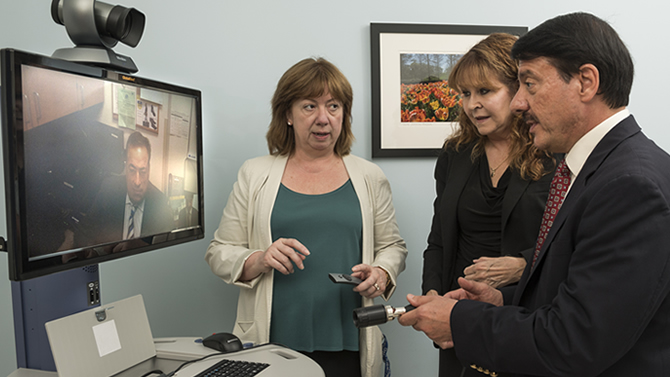


Telehealth certificate
Photo by Kathy F. Atkinson August 16, 2016
New UD program to prepare telehealth coordinators
With technologies like teleconferencing and remote patient monitoring, health care practitioners all over the country are using telehealth to enhance the delivery and support of clinical health care, public health and health education.
Examples in Delaware include the University of Delaware’s Parkinson’s Clinic housed at the Science, Technology and Advanced Research (STAR) Campus. Using live videoconferencing, patients can consult with an out-of-state movement disorder specialist with expertise in the specific disease processes faced by Parkinson’s patients.
With no movement disorder specialist currently located in Delaware, patients were previously faced with the choice of traveling hundreds of miles, or foregoing the specialized care altogether.
Telehealth has been steadily gaining support in Delaware, and when Gov. Jack Markell joined state legislators and health care advocates at the STAR Campus to sign pivotal telehealth legislation last summer, Delaware became the 29th state to take the important next step of requiring insurers to cover health care services delivered via telemedicine.
Following this important milestone, the Telehealth in Delaware Conference was held last October, bringing together state, regional and national experts to discuss the challenges and opportunities for telehealth initiatives in Delaware and the region.
Offered through a partnership between Delaware Health and Social Services (DHSS), the Delaware Telehealth Coalition and UD’s Division of Professional and Continuing Studies, the conference explored telehealth’s applicability to a wide variety of health care settings and specialties, including emergency care, psychiatric services, rural health care, occupational therapy, chronic disease care, dental care, aging in place, speech therapy and mental health services.
Building on that momentum, UD’s new Advanced Telehealth Coordinator Certificate is being launched this fall, aimed at professionals who wish to gain the knowledge and skills necessary to support and expand the use of telehealth applications within their health care organizations, and prepare for the continued growth of telehealth in Delaware and the region.
The new program’s faculty brings together experts who have pioneered telehealth implementation in Delaware, led by program director and lead instructor Carolyn Morris, director of telehealth planning and development for DHSS and co-chair of the Delaware Telehealth Coalition, as well as one of last year’s conference organizers.
“The Delaware Telehealth Coalition along with Delaware’s health care community have identified telehealth training and education as the key to wider adoption of telehealth in Delaware and the region,” said Morris. “The new program is designed to provide comprehensive training to equip health professionals and administrators with the tools to plan, develop, and implement telehealth programs and train organizational members in the use of telehealth for improving access to care.”
“The curriculum was designed with a variety of health care practitioners and professionals in mind,” explained Morris. “From an in-depth look at telehealth applications to business and operational aspects, the course prepares participants to assume a variety of roles related to telehealth in any size health care organization.”
Also serving on the program faculty is Dr. Gerard Gallucci, DHSS medical director.
"Telehealth is expanding access to primary and specialty medical care for individuals in Delaware who previously could not access care,” explained Gallucci. “In addition, telehealth is providing opportunities for consumer and provider education through distance learning, and is bringing educational programs to providers who practice in the more remote areas of the state."
UD’s Ingrid Pretzer-Aboff, co-founder and director of UD’s Parkinson’s Clinic, will teach sessions focused on implementing a telehealth clinic, and can attest to the benefits of telehealth for patients’ access to care.
“Through telehealth technology we are able to provide direct patient access to a nationally known movement disorder specialist and Parkinson's clinical psychologist,” said Pretzer-Aboff. “We have improved the lives of many patients who would otherwise have not seen a specialist, or would have traveled a long distance to see one.”
Dr. Albert Rizzo is chief of pulmonary and critical care medicine as well as medical director of eCare for Christiana Care Health System. Virtual intensive care has been a reality at Christiana Care since 2006, and has been instrumental in providing telemonitoring across multiple sites, contributing to cost savings, as well as providing increased ICU patient monitoring and emergency response.
“Telehealth in the form of the tele-ICU has been evolving at Christiana Care over the past 10 years,” said Rizzo, who will serve as a guest lecturer in the certificate program. “Looking toward the future, we are exploring extending that reach to other units of the hospital as well as developing telemedicine initiatives in the realm of remote patient monitoring and chronic disease management outside the hospital setting."
The Advanced Telehealth Coordinator Certificate is being offered by UD’s Division of Professional and Continuing Studies. Classes will take place on Monday evenings this fall from Sept. 12 to Dec. 19 at Arsht Hall on UD’s Wilmington Campus, 2700 Pennsylvania Avenue.
UD students and UD alumni are eligible for a discount when enrolling in this program. Other discounts and financial assistance options are available.
For more information or to register for this program, visit the website, write to continuing-ed@udel.edu or call 302-831-7600.
Contact Us
Have a UDaily story idea?
Contact us at ocm@udel.edu
Members of the press
Contact us at 302-831-NEWS or visit the Media Relations website

